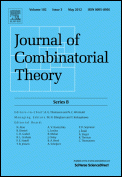
JOURNAL OF COMBINATORIAL THEORY SERIES B
Scope & Guideline
Illuminating the Path of Theoretical Advancements
Introduction
Aims and Scopes
- Graph Theory:
The journal focuses heavily on various aspects of graph theory, including but not limited to graph coloring, graph embeddings, and the study of specific graph classes. It encompasses both classical and contemporary problems in the field. - Matroid Theory:
Research related to matroids, including their properties, applications, and connections to graph theory, is a core area of interest. The journal publishes papers that explore matroid structures, matroid intersections, and their combinatorial properties. - Extremal Combinatorics:
Many papers investigate extremal problems in combinatorics, where researchers study the maximum or minimum size of a collection of finite objects satisfying certain properties. This includes Turán-type problems and results related to extremal graph theory. - Algorithmic and Computational Aspects:
The journal also covers algorithmic approaches to combinatorial problems, including polynomial time algorithms, complexity analysis, and combinatorial optimization problems. - Applications of Combinatorial Structures:
Papers that explore the applications of combinatorial structures in fields such as computer science, network theory, and discrete mathematics are also a focus, highlighting the practical implications of theoretical findings.
Trending and Emerging
- Random Graphs and Probabilistic Methods:
There is a noticeable increase in research related to random graphs and the application of probabilistic techniques in combinatorial problems. This trend reflects a growing interest in understanding the behavior of large random structures. - Algebraic Methods in Combinatorics:
Emerging themes include the use of algebraic techniques to solve combinatorial problems, particularly in matroid theory and graph theory. This includes studies on the interplay between algebra and combinatorial structures. - Network Theory and Applications:
Papers exploring the applications of combinatorial structures in network theory are on the rise, indicating a trend toward practical applications of combinatorial research in real-world scenarios, such as social networks and communication systems. - Interdisciplinary Approaches:
There is an increasing trend towards interdisciplinary research that combines combinatorial theory with other fields such as computer science, physics, and biology, reflecting a broader application of combinatorial concepts. - Extremal and Structural Graph Theory:
Recent publications indicate a growing interest in extremal and structural graph theory, with a focus on understanding the limits of graph properties and their implications, suggesting an active exploration of these foundational aspects.
Declining or Waning
- Classical Ramsey Theory:
While Ramsey theory has traditionally been a significant area of study, recent publications indicate a diminishing emphasis on classical Ramsey problems and their applications in combinatorial contexts. - Geometric Combinatorics:
The exploration of geometric aspects of combinatorics, including topics such as convex hulls and arrangements of geometric objects, has become less frequent in recent years, potentially overshadowed by more abstract combinatorial concepts. - Graph Minors and Excluded Minors:
Though still relevant, the focus on graph minors and excluded minor results appears to be waning, with fewer papers dedicated to this specific area compared to previous years.
Similar Journals

Journal of Combinatorics
Unraveling Complex Structures with Rigorous AnalysisJournal of Combinatorics is a premier academic journal dedicated to advancing the field of combinatorial theory and its applications. Published by INT PRESS BOSTON, INC, it aims to provide a robust platform for researchers, professionals, and students to disseminate their findings and engage with cutting-edge developments in combinatorics. With a focus on high-quality, peer-reviewed articles, the journal fosters rigorous mathematical discussions surrounding various facets of combinatorial structures, graph theory, design theory, and combinatorial optimization. Although currently not available as an Open Access journal, the Journal of Combinatorics plays a vital role in enriching the mathematical sciences and serves as an essential resource for academics seeking to stay updated with the latest trends in combinatorial research. By maintaining a commitment to excellence and innovation, this journal is indispensable for anyone looking to deepen their understanding in this critical area of study.

DISCRETE MATHEMATICS
Exploring the intricate world of combinatorics.DISCRETE MATHEMATICS, published by Elsevier, is a leading journal dedicated to the field of discrete mathematics and combinatorics, with a distinguished presence in the academic community since its inception in 1971. With an ISSN of 0012-365X and an E-ISSN of 1872-681X, this esteemed journal has firmly established itself within the Q1 category for Discrete Mathematics and Combinatorics, and Q2 for Theoretical Computer Science as per the 2023 metrics, underscoring its pivotal role in advancing research in these vital areas. DISCRETE MATHEMATICS is highly regarded, reflected in its Scopus rankings, where it stands at #44 out of 92 in its primary category, contributing significantly to the global discourse on complex mathematical theories and applications. Published from the Netherlands, the journal serves as a crucial resource for researchers, professionals, and students looking to stay informed about the latest innovations and methodologies in discrete mathematics. Though currently not an open-access journal, DISCRETE MATHEMATICS continues to foster a vibrant scholarly community through rigorous peer-reviewed research, promoting a deeper understanding of the mathematical structures that underpin both theoretical and applied science.
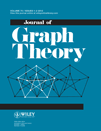
JOURNAL OF GRAPH THEORY
Elevating Research Standards in Geometry and TopologyJOURNAL OF GRAPH THEORY, published by WILEY, stands as a pivotal resource in the fields of Discrete Mathematics and Combinatorics, as well as Geometry and Topology. Since its inception in 1977, this esteemed journal has fostered the dissemination of influential research, currently categorized in the prestigious Q1 quartile according to the latest metrics for 2023. With an ISSN of 0364-9024 and an E-ISSN of 1097-0118, it caters to a global readership of researchers, professionals, and students dedicated to advancing their knowledge in graph theory. By maintaining a strong rank in Scopus—39th out of 106 in Geometry and Topology, and 38th out of 92 in Discrete Mathematics and Combinatorics—it reflects its significance and impact within the academic community. Although it does not offer open-access options, its rigorous peer-review process ensures that only high-quality original research is published, thus reinforcing its reputation as a leading journal in this mathematical domain.
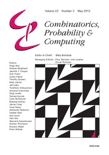
COMBINATORICS PROBABILITY & COMPUTING
Innovating Research at the Forefront of Applied MathematicsCOMBINATORICS PROBABILITY & COMPUTING is a premier journal published by Cambridge University Press, focusing on the cutting-edge fields of combinatorics, probability, and their computational aspects. Established in 1992 and set to continue its impactful discourse through 2024, this journal holds a distinguished reputation, reflected in its Q1 ranking in applied mathematics, computational theory, and statistics, showcasing its pivotal role in advancing research in these areas. With an ISSN of 0963-5483 and an E-ISSN of 1469-2163, the journal welcomes high-quality papers that contribute to the theoretical foundations and practical applications of the disciplines. While it is not available as open access, its accessibility through institutional subscriptions ensures wide readership within academia. The journal is a vital resource for researchers, professionals, and students alike, providing a platform for innovative ideas and pioneering research that shapes the future of mathematics and computer science.

COMBINATORICA
Fostering Innovation in Discrete Mathematics ResearchCOMBINATORICA, published by Springer Heidelberg, is a leading international journal dedicated to advancing the fields of Discrete Mathematics and Combinatorics. With an illustrious history dating back to 1981 and a remarkable commitment to excellence, this journal has earned its place in the highest echelons of academic publishing, currently ranked in the Q1 category for both Computational Mathematics and Discrete Mathematics and Combinatorics. Located in Germany and recognized for its high-quality research contributions, COMBINATORICA fosters innovative discussions and disseminates significant findings that shape contemporary mathematical theory. Although it does not offer Open Access options, its rigorous peer-review process ensures that each publication meets the highest scholarly standards, making it an essential resource for researchers, professionals, and students engaged in mathematical sciences. With an impactful H-Index reflecting its citation influence, COMBINATORICA continues to be a pivotal platform for groundbreaking research in combinatorics and its applications.

Australasian Journal of Combinatorics
Catalyzing Breakthroughs in Combinatorial StudiesThe Australasian Journal of Combinatorics, published by the CENTRE DISCRETE MATHEMATICS & COMPUTING, serves as a vital platform for researchers and professionals engaged in the dynamic field of discrete mathematics and combinatorics. With an ISSN of 2202-3518 and an E-ISSN of the same, this journal has been committed to open access since 2014, ensuring that groundbreaking research is readily available to a global audience. Based in Australia, specifically at the Department of Mathematics, University of Queensland, this journal spans the years from 1996 to 2024, showcasing the evolution of combinatorial research over nearly three decades. Recognized in the 2023 category quartiles as Q3 in Discrete Mathematics and Combinatorics, it ranks 68th out of 92 in Scopus, reflecting its growing influence despite its current percentile of 26th. The Australasian Journal of Combinatorics is dedicated to fostering innovative research and theoretical development, making it a valuable resource for academics and students alike.
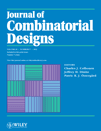
JOURNAL OF COMBINATORIAL DESIGNS
Connecting Researchers through Combinatorial InnovationJOURNAL OF COMBINATORIAL DESIGNS, published by Wiley, is a leading peer-reviewed journal that serves as a vital platform for researchers in the field of discrete mathematics and combinatorics. With an impressive Q1 ranking in the 2023 category, it stands at the forefront of academic discourse, showcasing significant developments and innovative research from 1993 to 2024. The journal is dedicated to the study of combinatorial designs, including their applications in various scientific disciplines, which enhances its relevance among mathematicians and applied scientists alike. Although it operates on a traditional subscription model, the journal continues to attract high-quality submissions, as evidenced by its Scopus rank of #40 out of 92 in Discrete Mathematics and Combinatorics, placing it in the 57th percentile. Its commitment to advancing knowledge in combinatorial theory and applications makes it an essential resource for professionals, researchers, and students seeking to deepen their understanding and contribute to this dynamic field.

Journal of Combinatorial Algebra
Advancing the Frontiers of Algebra and CombinatoricsThe Journal of Combinatorial Algebra, published by the European Mathematical Society (EMS), is a pioneering open-access journal dedicated to advancing research in the fields of Algebra and Number Theory, as well as Discrete Mathematics and Combinatorics. Since its inception in 2018, the journal has been committed to promoting high-quality, rigorous research, evidenced by its 2023 scopus rankings placing it in the second quartile across both disciplines. It serves as a vital platform for academics, researchers, and students to share innovative findings, methodologies, and theoretical advancements within combinatorial algebra, facilitating collaboration and knowledge dissemination in the mathematical community. With its open access policy adopted in 2021, the journal ensures that its content is freely available to a global audience, further enriching the landscape of mathematical research. The journal's editorial board, composed of leading experts, guarantees the integrity and academic excellence of published articles, making it an essential resource for those engaged in the dynamic fields of combinatorics and algebra.
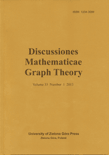
Discussiones Mathematicae Graph Theory
Connecting Researchers Through Graph Theory InsightsDiscussiones Mathematicae Graph Theory is a prestigious peer-reviewed journal published by UNIV ZIELONA GORA, specializing in the dynamic fields of Graph Theory, Discrete Mathematics, and Applied Mathematics. With an ISSN of 1234-3099 and an E-ISSN of 2083-5892, this Open Access journal has been providing unrestricted access to its content since 2013, promoting widespread dissemination and engagement in academic research. Established in 2009 and continuing its influential publication through 2024, Discussiones Mathematicae Graph Theory is committed to fostering collaborations and innovations among researchers, professionals, and students alike. Its impressive category quartiles for 2023 show it ranks within the Q3 range for both Applied Mathematics and Discrete Mathematics and Combinatorics, as well as good positions within the Scopus rankings, ensuring its critical relevance in the mathematical community. By continuously highlighting groundbreaking research in graph theory, this journal stands as a vital resource for anyone looking to advance their knowledge and contribute to the evolving landscape of mathematics.

Contributions to Discrete Mathematics
Advancing the frontiers of discrete mathematics.Contributions to Discrete Mathematics, published by the Department of Mathematics and Statistics at the University of Calgary, serves as a vital platform for disseminating innovative research within the dynamic field of discrete mathematics and combinatorics. Established in 2008, this journal has rapidly gained recognition, currently holding a Q3 classification in discrete mathematics and combinatorics for 2023. As it aims to foster academic dialogue and share groundbreaking discoveries, the journal showcases high-quality peer-reviewed articles that cover a range of topics, from theoretical explorations to practical applications. Although it currently operates under a traditional subscription model, there is a growing commitment to enhancing access options, ensuring that critical knowledge is available to researchers and practitioners alike. With its notable Scopus ranking of #50 out of 92 within its category, this journal is positioned as an important resource for students, academics, and industry professionals who seek to stay at the forefront of discrete mathematics research.